That Hoarder: Overcome Compulsive Hoarding
Hoarding disorder is stigmatised and people who hoard feel vast amounts of shame. This podcast began life as an audio diary, an anonymous outlet for somebody with this weird condition. That Hoarder speaks about her experiences living with compulsive hoarding, she interviews therapists, academics, researchers, children of hoarders, professional organisers and influencers, and she shares insight and tips for others with the problem. Listened to by people who hoard as well as those who love them and those who work with them, Overcome Compulsive Hoarding with That Hoarder aims to shatter the stigma, share the truth and speak openly and honestly to improve lives.
Episodes
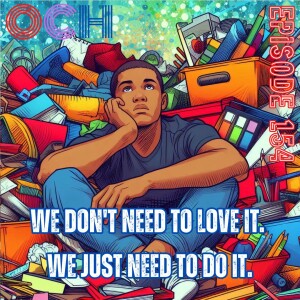
Friday Aug 30, 2024
Friday Aug 30, 2024
Come to a Dehoarding Accountability Zoom Session: http://www.overcomecompulsivehoarding.co.uk/ticket
Subscribe to the podcast: https://www.overcomecompulsivehoarding.co.uk/subscribe
Podcast show notes, links and transcript: https://www.overcomecompulsivehoarding.co.uk/podcast-ep-154-we-dont-need-to-love-it-we-just-need-to-do-it/
Today, I explore the reality of dehoarding. From the thrilling sense of accomplishment to the mundane, hard, and sometimes emotionally difficult aspects, I cover it all. Join me as I discuss the ups and downs of the journey and why loving the process isn't a requirement - getting it done is what counts.
The Importance of Persistence and Commitment in Dehoarding
The need to keep going even when it's not thrilling or empowering
Embracing the mundane and boring aspects of dehoarding
Understanding that progress is more important than loving every moment of the process
Recognising that dehoarding can include both rewarding and difficult experiences
Using reminders of the end goal to cope with the challenging days
Compassion and Self-Care in the Dehoarding Process
Embracing self-compassion during difficult dehoarding days
Utilising self-care practices as a way to cope with the process
Understanding the importance of acknowledging and validating difficult experiences
Acknowledging the necessity of perseverance and consistent effort in dehoarding
Coping with Mundane and Monotonous Aspects of Dehoarding
Recognising the importance of routine in the dehoarding process
Strategies and techniques to cope with monotony and boring tasks
Understanding the difference between emotional highs and lows, and coping with routine tasks
Utilising rewards and mindful strategies to cope with tedious dehoarding tasks
Redefining Success in Dehoarding
Understanding that success is measured by effort, home improvement, and personal pride
Acknowledging that dehoarding progress is not always thrilling or enjoyable
Embracing that progress is still progress, regardless of its size or level of excitement
Challenging unrealistic expectations set by influencers and social media about dehoarding
Action and Commitment Despite Feelings Towards Dehoarding
Encouragement to take at least one step in the right direction, regardless of loving the process
Embracing the idea that it's okay not to love dehoarding every minute
Recognising that commitment to dehoarding is a significant achievement in itself
Affirming the capability to create a space one feels at home in, despite the ups and downs of the journey
Dehoarding doesn't have to feel thrilling.
Difficulties come, but remember your purpose.
Feeling overwhelmed is normal during the decluttering process, but progress matters more than celebrating every step.
Self-care involves activities like hot baths, TV time, and walks, paired with self-compassion to be effective.
Reward self, be mindful, focus on present, seek support, value effort over success.
Embrace the journey, take steps forward.
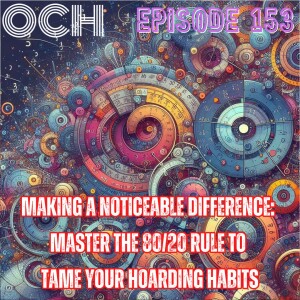
Friday Aug 23, 2024
Friday Aug 23, 2024
Come to a Dehoarding Accountability Zoom Session: http://www.overcomecompulsivehoarding.co.uk/ticket
Subscribe to the podcast: https://www.overcomecompulsivehoarding.co.uk/subscribe
Podcast show notes, links and transcript: http://www.overcomecompulsivehoarding.co.uk/
In today's episode, I look at how the Pareto Principle, also known as the 80/20 rule, can revolutionise our approach to decluttering. I discuss how focusing on the 20% of our possessions that cause 80% of our problems can lead to more impactful change with less effort, and how identifying the 20% of tasks that show the biggest results can help us to manage our energy and make visible progress. Join me as I break down this principle and explore how it can transform our mindset and approach to dehoarding.
Introduction to the Pareto Principle
Explanation of the Pareto Principle or the 80/20 rule
Relevance of the Pareto Principle to hoarding and home management
Impact of focusing on the 20% causing the most problems
Identifying Impactful Tasks and Items
The impact of expending energy on low-level tasks
Importance of prioritising impactful tasks for noticeable change
Making a dent in belongings by focusing on impactful items
Brief history of Vilfredo Pareto and his observation
Various contexts where the Pareto Principle is seen to apply
Validation of the principle in different areas
Applying the Pareto Principle to Your Home
Strategic thinking in identifying items causing disruption
Identifying 20% of belongings used most often
Energy expenditure and impact of dehoarding actions
Emotional Attachment & Rational Decision Making
Emotional connection to belongings
Encouraging rational assessment of belongings' value
The role of emotions in retaining or discarding items
Reassessing and Ongoing Vigilance
Need for ongoing reassessment as space is cleared
Importance of reassessing the 20% causing problems
Frequency of reassessment and calibrating belongings
Reflecting on the impact of the 80/20 rule in home management
Pareto principle for hoarders.
Pareto principle: 20% effort, 80% results.
Reframe, prioritise, and declutter for efficient living.
Identify essential items, discard unnecessary possessions strategically.
Identify unnecessary items to make life easier.
Reevaluate possessions and focus energy efficiently.
Use the Pareto principle to focus on tasks with high impact.
Identify and declutter items for a noticeable ease in daily life; use the 80/20 rule for organising and resolving space issues.
Reassess belongings, focus on what matters.
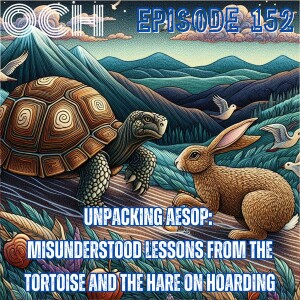
Friday Aug 16, 2024
Friday Aug 16, 2024
I look at an old fable from when I was little and how I’ve changed my view on it completely. And, of course, how it relates to hoarding – and dehoarding.
Acknowledging reaching 250,000 downloads for the podcast
Dehoarding fast vs. slow and steady approach
The benefits of dehoarding fast
Getting a lot done in a short time
Responding to emergency situations
Harnessing sudden bursts of motivation
The risks of dehoarding fast
Burnout
Impracticality of sustaining a fast pace in the long term
Emphasising the importance of finding a balance between fast and slow dehoarding
Acknowledging the benefits and drawbacks of both approaches
The significance of Aesop's fable "The Hare and the Tortoise"
Initial scepticism about the fable
Understanding the importance of perseverance and consistency over speed
Drawing parallels between the fable and dehoarding
Primary Topic: Slow and steady work for dehoarding
Sustained approach for dehoarding the entire home
Making habits or new behaviours stick and become habitual
Enhancing slow progress with focus and documentation
Achieving objective progress through slow and steady work
Suitability for long-term planning and sustainable change in behaviours and beliefs
Riding the wave when the urge to throw into action arises
Recognising when to work fast
Potential drawbacks leading to complacency or exhaustion
Balancing fast and slow dehoarding approaches
Finding a balance for effective and sustainable progress
Avoiding the pitfalls of extremes in dehoarding approaches
Fast action can be encouraging and valuable.
Sustainable pace fosters effective dehoarding.
Slow, steady progress towards a liveable home.
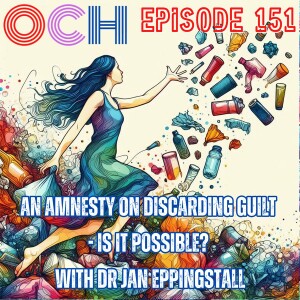
Friday Aug 09, 2024
Friday Aug 09, 2024
Come to a Dehoarding Accountability Zoom Session: http://www.overcomecompulsivehoarding.co.uk/ticket
Subscribe to the podcast: https://www.overcomecompulsivehoarding.co.uk/subscribe
Podcast show notes, links and transcript: http://www.overcomecompulsivehoarding.co.uk/
Dr Jan Eppingstall has had an idea, and it is as revolutionary as it is terrifying. We talk about it!
Shifting focus from individual items to the bigger picture
Creating a guilt-free zone for a limited time to honour values and experience more joy and fun in the future
Putting aside certain values temporarily to create better conditions for the future
Introduction of the concept of "household equilibrium"
Understanding the emotional attachment to possessions based on lived experiences
Behavioural and Emotional Aspects of Discarding Items
Reluctance to discard out-of-date food due to guilt and fear of waste
Emotional connection to possessions and the importance of using them
Encouraging the usage and enjoyment of possessions
Trauma-focused approach to discarding clutter
Coping with the guilt and shame around wastefulness
Making difficult decisions about discarding items
Exposure to letting go and small, less risky decluttering tasks
Letting go of controlling outcomes and focusing on wellbeing over perfect disposal
Starting with low-risk categories when decluttering, such as wrapping paper
Prove that terrible things do not happen when decluttering
The importance of proportionality in the decluttering process
Children's Belongings and Autonomy in Decluttering
Clear guidelines for disposing of belongings that are not yours
Contacting owners to collect items, especially for children's belongings
Revisiting keepsakes periodically to reassess their importance
Respecting children's decisions about their belongings
Navigating the decluttering process with understanding and sensitivity
Creating a Safe and Comfortable Living Environment
Implementing an amnesty on existing rules and guidelines
Suspending the acquisition of new items to keep the space in equilibrium
Allowing space for new interests and hobbies to enter one's life without guilt
Desire for perfection leads to unnecessary clutter.
Temporary pause for a more balanced life.
Stay safe and open to new experiences.
Encouraging use of gorgeous clothes in daily life.
Helping people cope with guilt and clutter to prioritise their well-being.
Desire for perfection in decision making and finding balance.
Some people value frugality but need to let go sometimes.
Focus on physical safety, declutter for new hobbies, no guilt.
Facing fears leads to growth and relief from guilt.
Recommendation to limit exposure to items and practice letting go to avoid regret.
Encourage using and enjoying clothes, shoes.
Expressing love for a cherished mug.
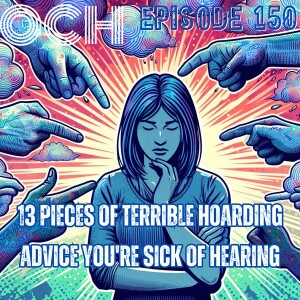
Friday Aug 02, 2024
Friday Aug 02, 2024
Come to a Dehoarding Accountability Zoom Session: http://www.overcomecompulsivehoarding.co.uk/ticket
Subscribe to the podcast: https://www.overcomecompulsivehoarding.co.uk/subscribe
Podcast show notes, links and transcript: http://www.overcomecompulsivehoarding.co.uk/
It’s the 150th episode, and I’ve got a special one for you. I’m tackling the 13 pieces of hoarding advice that you're really tired of hearing, and I’m hitting them head on! We've all been on the receiving end of well-meaning but utterly unhelpful advice when it comes to hoarding. From "just get rid of it" to "you're being lazy"… the list goes on. They may seem harmless, but they often overlook the emotional complexities and serious mental health challenges faced by people who hoard. Most importantly, I explain why these pieces of advice do more harm than good. Oversimplified solutions just won't cut it when it comes to overcoming hoarding disorder.
Terrible Hoarding Advice
"Just get rid of it" underestimates the emotional attachment
Emotional attachment to possessions
Overwhelming nature of such advice
"It's just stuff" overlooks the significance of possessions
The significance of possessions to hoarders
Dismissal of the emotional connection to items
"Get rid of things that don't spark joy" oversimplified and doesn't consider complexities
Oversimplification of the decluttering process
Failure to recognise the complexities of hoarding disorder
Blaming hoarders for being lazy, weak, or selfish is not helpful
Stress and shame reinforcement
The impact of negative reinforcement on mental health
Telling hoarders to be embarrassed or ashamed is counterproductive
Exacerbation of hoarding tendencies
Implications for mental health and stigma
"Just get a skip" advice may create time pressure, anxiety, and public display
Pressure and anxiety for hoarders
Public display of possessions and potential distress
Cleaning up a hoarder's space without consent creates mistrust and anxiety
Impact on trust and mental well-being
Reinforcement of trauma responses
Suggesting to sell or have a yard/car boot sale oversimplifies things
Complexity of hoarding disorder
Dismissal of mental health issues
Decluttering advice of doing one room a day or week underestimates the difficulty
Emotional challenges of decision-making
Complexity of hoarding disorder
Three piles for keep, give away, and throw away is not effective as stand-alone advice
Emotional attachment and decision-making
Complexity of decluttering for hoarders
Telling someone to try harder and give 100% effort at all times is unrealistic
Unrealistic expectations and burnout
Impact on mental health and sustainability
Long-term and complex nature of decluttering
Understanding the complexity of the process
Mental and emotional focus of decluttering
Hoarding as a Complex Process
Comparison of decluttering to a marathon
The endurance required for decluttering
Criticism of advice containing the word "just"
Casual dismissal of hoarding tendencies
Encouragement to reconsider using "hoarder" casually
Impact on stigma and understanding
Consider emotional attachment in addressing hoarding issues.
Hoarding disorder is complex and deeply personal.
Blaming hoarders reinforces shame and hinder recovery.
Skips can be a stressful solution.
Car boot sale: a communal yard sale.
Oversimplifying, dismissing mental health issues - not helpful.
Avoid burnout by pacing and considering emotions.
Simplify, declutter, and be mindful of health.
Reconsider comparing mild mess to hoarding.
Advice to declutter doesn't consider emotional attachment; drastic approach may cause fear and anxiety.
Hoarding disorder is complex, possessions hold deep meaning, and one-size-fits-all approaches don't work.
Blaming hoarding on laziness is unhelpful and untrue.
Using skips as a solution for decluttering can create anxiety for some as it puts their possessions on public display.
Car boot sales are similar to yard sales, with people selling items from their car boots in a car park on Sundays. Sellers might not get much for their cherished items.
Avoid burnout by pacing efforts for long-term decluttering, including handling emotionally charged items with care.
Casual use of mental health terms.
Hoarding is not just about having too much stuff; it affects emotions and living conditions.
Avoid comparing mild mess to hoarding.
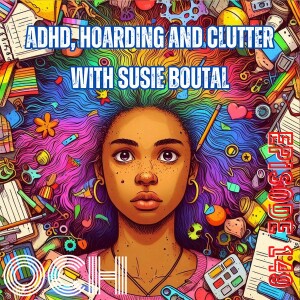
Friday Jul 26, 2024
Friday Jul 26, 2024
Come to a Dehoarding Accountability Zoom Session: http://www.overcomecompulsivehoarding.co.uk/ticket
Subscribe to the podcast: https://www.overcomecompulsivehoarding.co.uk/subscribe
Podcast show notes, links and transcript: http://www.overcomecompulsivehoarding.co.uk/
Susie Boutal is a qualified ADHD coach and decluttering expert. She joins me to talk about the intersection of ADHD, hoarding, and clutter. Susie shares valuable insights for anyone dealing with ADHD and hoarding. We cover the myth of laziness, the importance of open communication in relationships, managing hoarding behaviour, the impact of self-talk, and the influence of past experiences on self-perception and the responsibility to yourself and others in managing living spaces. Join us as we navigate the complexities of decluttering and hoarding with compassion and empathy, and gain valuable advice from Susie on nurturing a kinder inner dialogue.
Negotiations and Agreements in Relationships
Compassionate Expression of Needs
Impact of Self-Talk and Past Experiences on Self-Perception
Nurturing a Kinder Inner Dialogue
Offering Yourself Compassion and Empathy
ADHD and Clutter
Impulsivity
Compassionate Approach to Motivate Decluttering
Guilt and Shame
Breaking Tasks into Microtasks
Tips for People Dealing with ADHD and Hoarding
Self-Compassion
Establishing Daily Non-negotiable Routines
Breaking Down Tasks into Small Goals
Approaching Uncertainty as a Space of Possibilities
Overcoming Procrastination
Identifying Procrastination Triggers
Breaking Tasks into Achievable Goals
Maximise Productivity and Time Management
Reassessing Productivity in Small Time Periods
Using Small Time Intervals for Decluttering
Addressing Impulsivity in Acquiring Items
Finding Long-Term Purpose
Managing Living Spaces in Relationships
Open Communication
Setting Non-Negotiable Priorities
Overcoming decluttering barriers with 5-minute tasks.
Find purpose by identifying goals, prioritise passions.
Setting rules, responsibility, and personal growth awareness.
Establishing boundaries and agreements in relationships.
Recognising patterns
Impact of words can last a lifetime.
Establish routines, question resistance, break tasks down.
Embrace uncertainty as a challenge, not a threat.
Clutter linked to ADHD, trauma, mental health, impulsivity, and seeking new things.
Focusing on microtasks for motivation and habit building.
Decluttering seems overwhelming, but starting with small tasks can be motivating
Find purpose, set long-term goals, prioritise over short-term impulses.
Setting rules and responsibility to overcome impulses and seek long-term goals.
Open communication and defining nonnegotiables is crucial in living together respectfully.
Negotiating boundaries and agreements in all relationships, including regarding space and activities.
Recognising negative patterns, understanding origins, finding benefits in change, and being kinder to yourself.
The lasting impact of hurtful words.
Routines, self-reflection, and breaking tasks down.
Embracing uncertainty leads to growth, while fear of uncertainty causes paralysis.
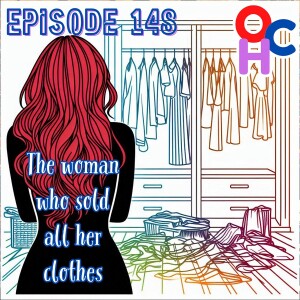
Friday Jul 19, 2024
Friday Jul 19, 2024
Come to a Dehoarding Accountability Zoom Session: http://www.overcomecompulsivehoarding.co.uk/ticket
Subscribe to the podcast: https://www.overcomecompulsivehoarding.co.uk/subscribe
Podcast show notes, links and transcript: http://www.overcomecompulsivehoarding.co.uk/
Today, I talk about a woman who sold every single thing in her wardrobe and explore the lessons that can be learned from this drastic approach, discussing both the positive and less than ideal aspects of the woman's actions. Highlighting the importance of taking small actions and steering away from all-or-nothing thinking, I look at what we who have difficult home surroundings can learn from this
Acknowledging annoyance and taking action against it.
Overcoming scarcity mindset and emotional attachments to possessions.
Liberating to sell clothes, or all-or-nothing thinking?
Gradual progress leads to lasting change and adaptation.
Exploring actions and habits to address annoyances.
Don't have to do extreme decluttering.
Small actions are valuable.
Incorporate new behaviours consistently.
Slow progress is more effective than dramatic change for long-term success.
Accepting and embracing feelings as a human reaction.
Taking Action on Annoyances
Acknowledging ongoing annoyances
Taking decisive action to address the problem
Decisiveness
Being inspired by the woman's decisiveness
Overcoming overthinking and indecisiveness
Finding fulfillment and reward in making a dramatic change
Feeling liberated by having considerably less stuff
Living with Considerably Less
Realising that living with less is not a threat
The protective nature of hoarding behaviour
Less Ideal Aspects of Extreme Action
All-or-Nothing Thinking
Recognising the danger of extremes in decision making
Embracing the value of moderation and balanced action
Small Actions versus Grand Gestures
The importance of small, consistent actions over grand gestures
Building lasting change through gradual progress
Overcompensating
The dangers of drastically clearing out possessions
Gradual adaptation and adjustment to change
Accepting Feelings and Reactions
Understanding that feelings of overwhelm are a normal human experience
No Secondary Shame
Rejecting the idea that feeling hard emotions is a source of shame
Overcoming internalised beliefs about the negativity of emotions
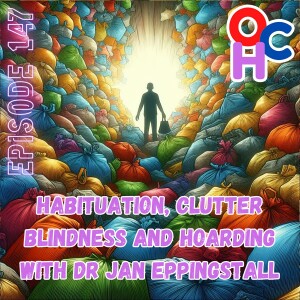
Friday Jul 12, 2024
Friday Jul 12, 2024
Come to a Dehoarding Accountability Zoom Session: http://www.overcomecompulsivehoarding.co.uk/ticket
Subscribe to the podcast: https://www.overcomecompulsivehoarding.co.uk/subscribe
Podcast show notes, links and transcript: http://www.overcomecompulsivehoarding.co.uk/
With Dr Jan Eppingstall, today I delve into the fascinating world of habituation – which you might be familiar with as clutter blindness, but it’s so much more than that! – and its impact on our daily lives. We look at the role of habituation in hoarding, and offer practical techniques to revitalise our perspectives. Join us as we unravel the complexity of habituation and its relationship to hoarding, with valuable insights into improving our quality of life.
Habituation and its Impact
Definition of habituation
Evolutionary and innate nature of habituation
Habituation as a form of non-associative learning
Role of habituation in daily life
Individual experiences with habituation
Positive, neutral, and negative aspects of habituation
Habituation in hoarding behaviour
Habituation and autistic people
Effects of habituation on daily tasks and decision-making
Habituation in relation to clutter blindness and hoarding
Overcoming Habituation
Techniques for combatting habituation
Changing daily routines and habits
Using different modes of transport
Performing everyday tasks in different ways
Looking at space through a different perspective
The need for a variety of approaches to combat habituation
Techniques to break habitual patterns
The importance of stepping out of your comfort zone
The importance of mixing up approaches and embracing what works
Habituation in Mental Health and Therapy
Deliberate use of habituation in mental health treatment
Exposure therapy and fear ladder approach in treating fears and phobias
Gradual exposure therapy for specific fears
Maintenance of progress in overcoming fears and phobias
Implications of habituation for individuals with autism spectrum disorders in relation to hoarding
Insight into habituation and its impact on hoarding behaviour
Techniques and advice for combating habituation
Examples of habituation in daily life
Experience of habituation in hoarding behaviour and clutter blindness
The impact of habituation on decision-making and compensating for clutter
Connection between habituation, working memory, and people-pleasing behaviour
Understanding the impact of habituation on decision-making and perceptions
Strategies for breaking habitual patterns and experiencing joy
Mindfulness and gratitude in daily life
Rekindling appreciation for familiar places and seeing them through fresh eyes
Encouragement to find joy in life and invest in experiences over material possessions
Non-associative learning: Becoming accustomed to stimuli.
Habituation serves necessary and neutral purposes.
Skipping stages and creating fear ladder for hoarding.
Clutter organization leads to joy, not regret.
Habituation in hoarding leads to inaction.
Removing obstacles can make daily tasks easier.
Visual cues and externalising tasks aid memory.
Self-sufficiency
Observing and changing habits leads to improvement.
Experiences linger longer than material possessions.
Habituation is normal and can be positive.
Habituation is the process of becoming less responsive to repeated stimuli.
Habituation serves purposes: prevent overwhelm, allow focus, survival. Good, neutral, negative aspects.
Overstimulation and stimming behaviors.
Reliance on visuals becomes less effective.
Visual reminders and working memory limitations prompt use of external systems to record and remember tasks.
Some people have a mindset of overcoming odds and finding resourceful solutions.
Changing habits and mindset is key for improvement.
Observing and reflecting on how things are done can lead to finding better, more efficient ways.
The key is to have a mix of approaches for habit change.
Variety is essential and embrace what works, even if just for a bit.
The mind values experiences over possessions for lasting impact.
Habituation is normal, can be positive, neutral, or negative, and can be used to reduce distress.
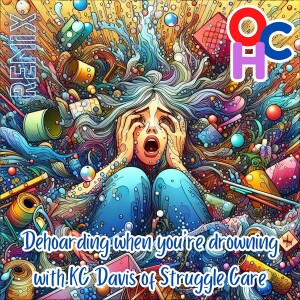
Friday Jul 05, 2024
Friday Jul 05, 2024
Come to a Dehoarding Accountability Zoom Session: http://www.overcomecompulsivehoarding.co.uk/ticket
Subscribe to the podcast: https://www.overcomecompulsivehoarding.co.uk/subscribe
Podcast show notes, links and transcript: http://www.overcomecompulsivehoarding.co.uk/
Incredible conversation with the ever-insightful KC Davis of Struggle Care. From discussing the impact of accumulating unused items to exploring the mental and emotional barriers people face in decluttering and tidying up, this episode covers a wide range of strategies and insights to help you on your dehoarding journey. We look at the shame and stigma associated with struggling with care tasks, including dehoarding, and the impact on individuals' self-worth and ability to seek help, and replace the shame with an approach rooted in self-compassion and moral neutrality towards care tasks. So if you're looking for practical tips, empathy, and support on your dehoarding journey, you won't want to miss this episode!
Understanding Care Tasks and Struggles
Definition of "care tasks"
Stigma and shame surrounding struggles with care tasks
Impact on self-worth and ability to seek help
Overcoming Shame and Stigma
Fear and self-criticism
Importance of self-compassion and supportive community
Motivation and the limitations of shame
Individualised solutions rooted in self-compassion
Thriftiness and environmental concerns
Strategies for Task Initiation and Motivation
Challenges for hoarders and those with ADHD
Differentiating motivation and task initiation
Small steps, transitions, and tools for task initiation
Starting the Decluttering Process
No one right way to start
Making small decisions and using timers
Involving friends in parting with items
Overcoming Emotional Barriers to Decluttering
Impact of accumulated items and their eventual outcome
"5 things theory" to overcome resistance
Adjusting the tidying process and taking small steps consistently
Strategies for Organising and Tidying Up
Breaking tasks into smaller steps
Visual storage ideas and creating rituals
Setting priorities and challenging societal norms
Judgments based on work, race, and appearance
Many people feel therapy isn't addressing their needs.
Shame doesn't lead to lasting behaviour change.
Self-help methods are not one-size-fits-all.
Permission to accommodate leads to lasting change.
Challenges of ADHD and executive functioning explained.
Declutter by what I need, love, keep.
Motivation leads to easier hard work and decluttering.
Take small steps and make decisions.
Break tasks into small steps.
Community support for navigating vulnerability.
Many people find online content more helpful than traditional therapy, reflecting societal attitudes towards seeking help.
Shame and social pressure don't guarantee change.
Self-help space lacks personalised solutions for diverse challenges. Universal methods don't address individual barriers and needs.
People give themselves permission to accommodate and it leads to curiosity, not necessarily a finish line.
Challenges with executive functioning and organisation due to ADHD, struggling with clutter and distractions.
Sort items by frequency of use, happiness, and necessity. Prioritise what to keep, rather than what to discard.
Motivation leads to easier wins, declutter by discussing meaningful items with friends.
Taking small steps without pressure, performing tasks with enjoyable activities.
Breaking tasks into smaller steps and utilising a simple action to initiate it.

Friday Jun 28, 2024
Friday Jun 28, 2024
Come to a Dehoarding Accountability Zoom Session: http://www.overcomecompulsivehoarding.co.uk/ticket
Subscribe to the podcast: https://www.overcomecompulsivehoarding.co.uk/subscribe
Podcast show notes, links and transcript: http://www.overcomecompulsivehoarding.co.uk/
I watched a film, "Where Dragons Live," which struck a chord with themes of belongings, families, the meaning of our stuff, and the complexities of dealing with a loved one's stuff after they pass away. I talk about the deeper implications of what we leave behind. Join me as I reflect on the emotional impact of material possessions and the significance of our connections with others.
Film Review: Where Dragons Live
Review and discussion of the film "Where Dragons Live"
Exploration of themes relevant to hoarding, family dynamics and privilege
Reflection on the concept of treasuring and maintaining possessions
Analysis of the film’s portrayal of mixed, nuanced emotions and reactions
Examination of the anxiety surrounding what we leave behind for others
Emphasis on the impact of hoarding on one's own life and grieving process
Personal reflection on the burden and worry of leaving behind a hoarding home
Consideration of the challenges faced by those sorting through a hoarded space
Insight into the complexities of emotions and decision-making related to hoarding
Impact Beyond Possessions
Reflection on the value of relationships and connections beyond physical possessions
Examination of the meaningful impact individuals can leave on others
Emphasis on the significance of emotional and personal legacies
Discussion of minimising physical clutter to alleviate stress for others
Personal experiences related to friendships and legacies
Reflection on the meaningful contributions individuals can make in others’ lives
Recommendations for listeners to consider the impact they leave on others
Encouragement to prioritise meaningful connections over material possessions
Mixed emotions lead to decision-making challenges.
Grieving and hoarding
Overwhelm
Leave behind meaningful and powerful positive impact.
Film subjects reflect on sentimental items.
Grief and clearing out a hoarded home, finding value in the midst of overwhelming belongings.
Leaving meaningful impact beyond material possessions.
The film's focus on balancing material possessions with emotional value
Minimising belongings for others' sake.









